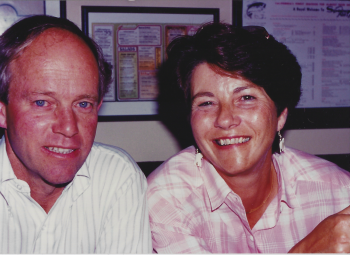Cliff Newell

NOAA Heritage Oral History Project
NOAA Heritage Oral History Project aims to document the history and legacy of NOAA through compelling interviews with its leaders. These firsthand accounts provide an invaluable resource that preserves NOAA's significant contributions to environmental research and management, fostering a deeper understanding of NOAA's vital role in shaping our understanding of the Earth's oceans and atmosphere.
On September 4, 2024, Molly Graham interviewed Cliff Newell in Phippsburg, Maine, for the NOAA Heritage Oral History Project. Newell discusses his family’s Irish immigrant background, early life in Bath, Maine, and his father’s career as a shipyard worker and police officer. He reflects on his childhood experiences, education, and initial interest in marine technology and diving, which shaped his career trajectory. Newell describes his work with the Bureau of Commercial Fisheries, including sea sampling and offshore tagging of lobsters, and his transition to NOAA, where he contributed to the development of underwater habitats like EDALHAB and Helgoland. He recounts his involvement in diving operations, including Navy dive training and supervising research missions in extreme environments such as the Bering Sea. Newell also discusses his role in advancing NOAA’s dive safety protocols, training over 1,200 divers, and establishing the NOAA Diving Program in Seattle.
On September 22, 2024, Molly Graham interviewed Cliff Newell in Phippsburg, Maine, for the NOAA Heritage Oral History Project. The interview explores Newell's extensive experience in underwater research and NOAA's diving programs, including his participation in the Florida Aquanaut Research Endeavor (FLARE), which utilized the EDELHAB habitat for saturation dives. He discusses studying artificial tire reefs and the challenges posed by chemical leaching, as well as his observations on the adaptation of marine life to these structures. Newell details his work with various underwater habitats, including Hydrolab in St. Croix and Helgoland, where he conducted research on herring spawning and hydroacoustics. He recounts his involvement in saturation dives, including the logistics, living conditions, and decompression protocols, and reflects on the role of such projects in advancing marine science. The interview also covers the evolution of NOAA's diving program, his role in establishing standardized equipment protocols, and the integration of hyperbaric chambers for diver safety. Newell shares anecdotes about his collaboration with notable figures such as Sylvia Earle and Morgan Wells, the establishment of NOAA's Aquarius habitat, and his contributions to training programs for NOAA divers and medical personnel. He also addresses the challenges of diving in contaminated environments, his participation in the recovery efforts following maritime accidents, and the broader implications of NOAA's research on fisheries and marine ecosystems.
Please Note: The oral histories in this collection are protected by copyright and have been created for educational, research and personal use as described by the Fair Use Doctrine in the U.S. Copyright law. Please reach out Voices@noaa.gov to let us know how these interviews are being used in your research, project, exhibit, etc. The Voices staff can help provide other useful resources related to your inquiry.
The NOAA mission is to understand and predict changes in climate, weather, oceans, and coasts, to share that knowledge and information with others, and to conserve and manage coastal and marine ecosystems and resources. The Voices Oral History Archives offers public access to a wide range of accounts, including historical materials that are products of their particular times, and may contain offensive language or negative stereotypes.
Voices Oral History Archives does not verify the accuracy of materials submitted to us. The opinions expressed in the interviews are those of the interviewee only. The interviews here have been made available to the public only after the interviewer has confirmed that they have obtained consent.
